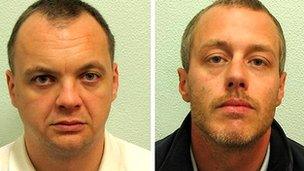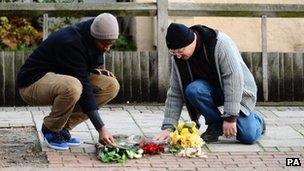Stephen Lawrence: Gary Dobson and David Norris get life
- Published
Neville Lawrence urged Norris and Dobson to give up any accomplices to his son's murder
Two men found guilty of the 1993 racist murder of Stephen Lawrence in south-east London have been jailed for life.
Gary Dobson will serve a minimum of 15 years and two months, and David Norris 14 years and three months.
The pair were sentenced at the Old Bailey under guidelines in place at the time of the attack and as juveniles because both had been under 18.
Later, detectives said new information about the case had come in since the verdicts were returned 24 hours ago.
Det Ch Insp Clive Driscoll, who was commended by the trial judge for his work on the case, told BBC News the information was currently being evaluated.
Officers from the Lawrence inquiry team will discuss the case at a meeting with senior Scotland Yard officers next week.
'Hands tied'
Passing sentence, the judge, Mr Justice Treacy, described the crime as a "murder which scarred the conscience of the nation".
Dobson, 36, and Norris, 35, were the first people convicted over the fatal attack on Mr Lawrence by a group of white youths near a bus stop in Eltham on 22 April 1993.
Speaking outside court, Stephen Lawrence's mother Doreen said the minimum terms imposed "may be quite low" but she recognised "the judge's hands were tied" and thanked him for his sentencing remarks which acknowledged the stress the family had suffered for 18 years.
"It's the beginning of starting a new life," she said.
Stephen Lawrence's father, Neville, said: "This is only one step in a long, long journey."
He thanked the police, the judge and the jury, and called on the pair to "give up" the other people involved in his son's murder.

Gary Dobson and David Norris had denied murder
At an earlier media conference on Wednesday, Metropolitan Police Commissioner Bernard Hogan-Howe said: "The other people involved in the murder of Stephen Lawrence should not rest easily in their beds.
"We are still investigating this case and I would just like to take this opportunity, if anybody out there has any more information or any evidence, even after all this time, please tell us then we'll do the rest."
In his sentencing remarks, which have now been published online,, external the judge also said he hoped the convictions of Norris and Dobson would "not close the matter", and that police would be alert to further lines of inquiry.
'Racist thuggish gang'
A jury found Dobson and Norris guilty of murder on Tuesday after a six-week trial that hinged on new scientific evidence.
BBC correspondents said the press benches were packed for the sentencing, and there was a huge queue for the public gallery. The hearing was delayed as the courtroom had to be rearranged to allow members of Stephen Lawrence's family to attend, and the judge allowed some journalists to stand.
In passing sentence, Mr Justice Treacy said: "The crime was committed for no other reason than racial hatred."
He said the black teenager was "completely blameless and helpless".
"A totally innocent 18 year old youth on the threshold of a promising life was brutally cut down in the street in front of eye witnesses by a racist thuggish gang," he told Dobson and Norris.
"You were both members of that gang. I have no doubt at all that you fully subscribed to its views and attitudes."
He said the assault was "a brief but co-ordinated attack, a racist taunt, a charge and a swallowing up of Stephen Lawrence".
"I'm sure that you knew one of your group was armed with a knife that night," the judge said. "The evidence does not prove you had the knife, but the holder had it with your approval."
Mr Justice Treacy said the encounter was not premeditated but Dobson and Norris had been prepared to attack if the opportunity arose.
He said no contrition had been shown.
Mr Justice Treacy said: "Stephen Lawrence is not the only victim of this crime. His family, (two parents, a brother and a sister), whose victim impact statements I have read, have been most grievously affected.
"So has his friend Duwayne Brooks. Of that I have no doubt."
Mr Brooks, who was with Mr Lawrence on the night of the attack, had wept while giving evidence at the trial.
Failures in the Lawrence case investigation had previously "shamed" police, he said, but they could now be commended for their work, as could the forensic scientists involved in obtaining the evidence which allowed the prosecution of Dobson and Norris to take place.
The judge said the terms were lower than some would expect as he was "constrained" by Parliament and he could not apply tougher sentencing rules drafted in 2003.
As Mr Justice Treacy rose to leave the court, there was applause from some members of the public, but Dobson's father, Stephen, shouted: "Shame on all of you."

Flowers were placed on the Stephen Lawrence Memorial in Eltham after Tuesday's verdict
Outside court, Michael Mansfield QC, who represented the Lawrence family in a 1995 private prosecution, said: "In this particular case, given the nature of the original offence, given their own denial throughout, given the surveillance video which showed a deep-seated hatred, bigotry and violence, it seems to me a parole board will take very great care before releasing these two [Dobson and Norris] onto the streets."
Doreen Lawrence's lawyer Imran Khan told BBC News he hoped there were "people out there who see her and recognise that there are still an injustice there and whilst there may not be forensic evidence now there may be people out there whose allegiances have changed... I urge them to come forward sooner rather than later".
Questioning whether police should feel "a sense of redemption" at the convictions, he added: "If the police say they're going to investigate further, then they should do so properly. The last thing that should happen is further failures in this case and raising the hopes of the Lawrences."
'Case reviewed'
Police arrested Dobson and Norris and three other suspects in the months after Mr Lawrence's murder in April 1993, but the Crown Prosecution Service (CPS) dropped the case, saying the evidence of a key witness was unreliable.
The CPS later said fresh evidence presented by the Lawrence family's barrister was not sufficient for a new prosecution, and the family launched a private prosecution against Dobson and two others which failed.
An inquest later delivered a verdict of unlawful killing "in a completely unprovoked racist attack by five youths" and in 1999 a public inquiry into the case led to the Metropolitan Police being branded institutionally racist.
Scientists conducting a review of the case in 2007 found a tiny bloodstain on Dobson's jacket that could only have come from Mr Lawrence.
They also found a single hair belonging to the teenager on Norris's jeans. The scientists recovered the material from evidence the police had held all along, using advanced techniques which were not available to the original case scientists.
During their trial, Dobson and Norris denied murdering Mr Lawrence and said their clothing had been contaminated as police mixed up evidence over the years. Detectives spent months establishing the movements and handling of the exhibits since 1993, and the jury was told that contamination was implausible.
Doreen Lawrence: "How can I celebrate when my son lies buried?"
Matthew Ryder QC, who represented the Lawrence family in its civil claim against the police told BBC Radio 4's Today programme the case was "moment when you saw the victims of injustice fighting for justice and the system letting them down and I think for that reason it profoundly changed how we view race and racism within this society".
The former commissioner of the Metropolitan Police Lord Blair said the case had seen police move from a "colour-blind" approach to policing to one which understood the previous experiences and expectations held by different communities.
"The legacy of Stephen Lawrence is just of the most enormous change possible in policing," he said.